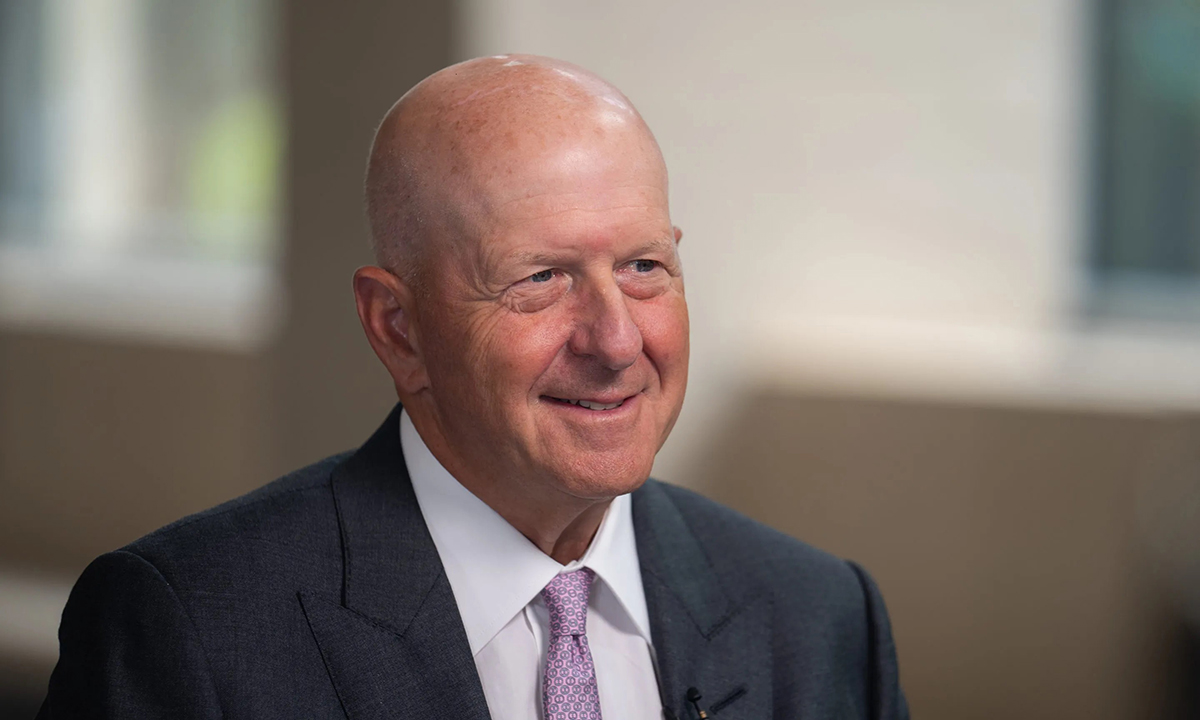
想在高盛(Goldman Sachs)找到一份工作比進(jìn)哈佛(Harvard)還難,。
不,,這是事實(shí)。今年,,這所美國歷史最悠久的大學(xué)錄取了3.6%的新生申請者,。據(jù)高盛首席執(zhí)行官大衛(wèi)·所羅門(David Solomon)稱,備受尊崇的投資銀行高盛去年收到了“略多于”30萬份應(yīng)屆大學(xué)畢業(yè)生的初級職位申請,,他們聘用了約2500人,。錄取率低于1%,所羅門對此引以為豪,。
所羅門在接受彭博社記者大衛(wèi)·魯賓斯坦(David Rubinstein)采訪時(shí)說:“我們從世界各地的學(xué)校和大學(xué)中廣泛招聘人才,;我們努力擴(kuò)大招聘范圍。我們尋找的是擁有良好職業(yè)道德,,以及主修科學(xué),、技術(shù)、工程和數(shù)學(xué)類學(xué)科的人才,。我們公司有1萬多名工程師,,所以會雇傭很多工程師?!?
他說,,總的來說,這家銀行尋找的是聰明,、勤奮的畢業(yè)生,,這些畢業(yè)生“追求卓越,求勝心切,,并已證明自己有勇氣和決心,也有能力取得成功,,而且在失敗時(shí)也能振作起來,,繼續(xù)前進(jìn)”。
這些都是很高的要求,,所羅門對此深有體會,。他透露,就連首席執(zhí)行官本人也曾被該銀行拒絕過兩次,,直到1999年才最終超越了銀行對他的偏見,。
20世紀(jì)80年代初,擁有漢密爾頓學(xué)院(Hamilton College)政治學(xué)學(xué)位的年輕所羅門參加了紐約市“多家銀行機(jī)構(gòu)”的面試,,最終被商業(yè)銀行歐文信托公司(Irving Trust Company)錄用,,并參加了該公司的培訓(xùn)項(xiàng)目。所羅門在接受彭博社采訪時(shí)表示:“我就是在那里開始了職業(yè)生涯,,并開始學(xué)習(xí)金融知識,,但在此之前我對金融知之甚少,。”
雖然沒有進(jìn)入高盛,,但也并非因?yàn)闆]有嘗試,。所羅門回憶說:“高盛是我致信要求面試的四五十家公司之一。它是回信的45家公司之一,,并表示'承蒙垂愛,,但您未通過篩選。'”
但這并不是這位銀行業(yè)希望之星的終點(diǎn),。他說:“我在歐文信托公司工作一年左右時(shí),,還去高盛面試過一個(gè)分析師職位,表現(xiàn)不錯(cuò),?!暗罱K在最后一次面試中,我被一位合伙人拒絕了,。那是在1985年,。因此,我在職業(yè)生涯早期就兩次遭到高盛的拒絕,?!?/p>
然而所羅門堅(jiān)持到底。他被前投資銀行德崇證券(Drexel Burnham Lambert)招募到銷售部門,,然后轉(zhuǎn)到貝爾斯登公司(Bear Stearns Cos,,同樣是前投行)。最終,,高盛在1999年左右邀請所羅門加入,,他在該公司上市后不久進(jìn)行了橫向調(diào)動。
所羅門告訴魯賓斯坦:“我當(dāng)時(shí)在貝爾斯登公司的職位相對較高,。我對(高盛)真的不感興趣,。但[公司]不停地打電話給我。有一天我突然對他說,,你知道嗎,?我確實(shí)應(yīng)該考慮一下。于是在1999年夏天,,也就是首次公開募股兩個(gè)月后,,我加入了公司?!?/p>
所羅門說,,但他從未想過加入高管層;他只是想“學(xué)習(xí),、成長,,做更多的業(yè)務(wù)”,。此外,他還說,,“你不可能以橫向方式進(jìn)入高盛,,并期望自己成為首席執(zhí)行官或管理合伙人?!?/p>
保持領(lǐng)先地位
然而,,命運(yùn)總是在不斷變化:今年將是所羅門在高盛擔(dān)任高管的第六個(gè)年頭。魯賓斯坦指出,,在他任職期間,,高盛的股票和市值“幾乎翻了一番”。
事實(shí)上,,所羅門非常關(guān)注這些主要指標(biāo),。他說:“我們是一家上市公司,要為股東創(chuàng)造價(jià)值,。在過去的六年里,,我認(rèn)為我們的市值增長了近1000億美元……我們把公司的平均收入從340億或350億美元提高到了現(xiàn)在的500多億美元?!?/p>
還有一些更抽象的目標(biāo),。他說:“當(dāng)你管理這樣一個(gè)實(shí)力雄厚的組織時(shí),其他事情也很重要,,它們也會帶來增長和進(jìn)步,。首先,我們是一家以客戶為中心的企業(yè),,如果客戶不信任公司(或)為他們服務(wù)的人——如果我們沒有在長期關(guān)系中建立信任,,沒有為他們提供出色的服務(wù)——我們就無法取得其他成果?!保ㄘ?cái)富中文網(wǎng))
譯者:中慧言-王芳
想在高盛(Goldman Sachs)找到一份工作比進(jìn)哈佛(Harvard)還難,。
不,這是事實(shí),。今年,這所美國歷史最悠久的大學(xué)錄取了3.6%的新生申請者,。據(jù)高盛首席執(zhí)行官大衛(wèi)·所羅門(David Solomon)稱,,備受尊崇的投資銀行高盛去年收到了“略多于”30萬份應(yīng)屆大學(xué)畢業(yè)生的初級職位申請,他們聘用了約2500人,。錄取率低于1%,,所羅門對此引以為豪。
所羅門在接受彭博社記者大衛(wèi)·魯賓斯坦(David Rubinstein)采訪時(shí)說:“我們從世界各地的學(xué)校和大學(xué)中廣泛招聘人才,;我們努力擴(kuò)大招聘范圍,。我們尋找的是擁有良好職業(yè)道德,,以及主修科學(xué)、技術(shù),、工程和數(shù)學(xué)類學(xué)科的人才,。我們公司有1萬多名工程師,所以會雇傭很多工程師,?!?
他說,總的來說,,這家銀行尋找的是聰明,、勤奮的畢業(yè)生,這些畢業(yè)生“追求卓越,,求勝心切,,并已證明自己有勇氣和決心,也有能力取得成功,,而且在失敗時(shí)也能振作起來,,繼續(xù)前進(jìn)”。
這些都是很高的要求,,所羅門對此深有體會,。他透露,就連首席執(zhí)行官本人也曾被該銀行拒絕過兩次,,直到1999年才最終超越了銀行對他的偏見,。
20世紀(jì)80年代初,擁有漢密爾頓學(xué)院(Hamilton College)政治學(xué)學(xué)位的年輕所羅門參加了紐約市“多家銀行機(jī)構(gòu)”的面試,,最終被商業(yè)銀行歐文信托公司(Irving Trust Company)錄用,,并參加了該公司的培訓(xùn)項(xiàng)目。所羅門在接受彭博社采訪時(shí)表示:“我就是在那里開始了職業(yè)生涯,,并開始學(xué)習(xí)金融知識,,但在此之前我對金融知之甚少?!?/p>
雖然沒有進(jìn)入高盛,,但也并非因?yàn)闆]有嘗試。所羅門回憶說:“高盛是我致信要求面試的四五十家公司之一,。它是回信的45家公司之一,,并表示'承蒙垂愛,但您未通過篩選,。'”
但這并不是這位銀行業(yè)希望之星的終點(diǎn),。他說:“我在歐文信托公司工作一年左右時(shí),還去高盛面試過一個(gè)分析師職位,表現(xiàn)不錯(cuò),?!暗罱K在最后一次面試中,我被一位合伙人拒絕了,。那是在1985年,。因此,我在職業(yè)生涯早期就兩次遭到高盛的拒絕,?!?/p>
然而所羅門堅(jiān)持到底。他被前投資銀行德崇證券(Drexel Burnham Lambert)招募到銷售部門,,然后轉(zhuǎn)到貝爾斯登公司(Bear Stearns Cos,,同樣是前投行)。最終,,高盛在1999年左右邀請所羅門加入,,他在該公司上市后不久進(jìn)行了橫向調(diào)動。
所羅門告訴魯賓斯坦:“我當(dāng)時(shí)在貝爾斯登公司的職位相對較高,。我對(高盛)真的不感興趣,。但[公司]不停地打電話給我。有一天我突然對他說,,你知道嗎,?我確實(shí)應(yīng)該考慮一下。于是在1999年夏天,,也就是首次公開募股兩個(gè)月后,,我加入了公司?!?/p>
所羅門說,,但他從未想過加入高管層;他只是想“學(xué)習(xí),、成長,,做更多的業(yè)務(wù)”。此外,,他還說,,“你不可能以橫向方式進(jìn)入高盛,并期望自己成為首席執(zhí)行官或管理合伙人,?!?/p>
保持領(lǐng)先地位
然而,命運(yùn)總是在不斷變化:今年將是所羅門在高盛擔(dān)任高管的第六個(gè)年頭,。魯賓斯坦指出,在他任職期間,高盛的股票和市值“幾乎翻了一番”,。
事實(shí)上,,所羅門非常關(guān)注這些主要指標(biāo)。他說:“我們是一家上市公司,,要為股東創(chuàng)造價(jià)值,。在過去的六年里,我認(rèn)為我們的市值增長了近1000億美元……我們把公司的平均收入從340億或350億美元提高到了現(xiàn)在的500多億美元,?!?/p>
還有一些更抽象的目標(biāo)。他說:“當(dāng)你管理這樣一個(gè)實(shí)力雄厚的組織時(shí),,其他事情也很重要,,它們也會帶來增長和進(jìn)步。首先,,我們是一家以客戶為中心的企業(yè),,如果客戶不信任公司(或)為他們服務(wù)的人——如果我們沒有在長期關(guān)系中建立信任,沒有為他們提供出色的服務(wù)——我們就無法取得其他成果,?!保ㄘ?cái)富中文網(wǎng))
譯者:中慧言-王芳
It’s harder to get a job at Goldman Sachs than it is to get into Harvard.
No, really. This year, the nation’s oldest university accepted 3.6% of its freshman applicants. Per CEO David Solomon, esteemed investment bank Goldman Sachs received “a little over” 300,000 applications for entry-level jobs from new college grads last year—and they hired about 2,500. That’s under a 1% acceptance rate, give or take—a percentage Solomon takes pride in.
“We recruit from a very broad selection of schools and universities all over the world; that’s one of the things that we’ve really tried to expand,” Solomon told Bloomberg’s David Rubinstein in an interview Thursday. “We look for a great work ethic, and majoring in a STEM kind of subject. We have over 10,000 engineers at the firm, so we hire a lot of engineers.”
On the whole, the bank looks for smart, hardworking grads who “believe in excellence, want to win, and have proven that they’ve got grit and determination and an ability to both succeed, but also when they fail to pick themselves up and dust themselves off and keep going,” he asid.
Those are tall orders, which Solomon knows well. Even the chief executive himself was rejected by the bank—twice—before finally making it past the velvet rope in 1999, he revealed.
Armed with a political science degree from Hamilton College, a young Solomon interviewed at “a bunch of banking institutions” in New York City in the early 1980s, and was eventually hired by the Irving Trust Company, a commercial bank, and placed in its training program. “That’s where I started my career and started to learn about finance, but I did not know much about it before that,” Solomon told Bloomberg.
It wasn’t Goldman, but not for lack of trying. “Goldman Sachs was one of 40 or 50 firms that I sent a letter to asking for an interview,” Solomon recalled. “It was one of the 45 that came back and said, no thank you.”
But that wasn’t the end of the road for the banking hopeful. “I also interviewed at Goldman for an analyst position when I’d been at Irving Trust for about a year, and I did well,” he said. “But ultimately I was turned down in the last interview, by a partner. That would have been in 1985. So I got two rejections from Goldman early in my career.”
Yet Solomon stayed the course. He was recruited to the sales desk at erstwhile investment bank Drexel Burnham Lambert, and then moved to (also erstwhile) Bear Stearns. Finally, Goldman came back around in 1999 and recruited Solomon to make a lateral move shortly after the firm went public.
“I was in a relatively senior position at Bear Stearns. And I really wasn’t interested [in Goldman],” Solomon told Rubinstein. “But [the company] kept calling and calling and calling. And he caught me on a day where suddenly I said, you know what? I should really look at this. And so in the summer of 1999, about two months after the IPO, I joined the firm.”
But he never had any aspirations towards joining the C-suite, Solomon said; he simply intended to “l(fā)earn, grow and do more of the business.” And besides, he said, “there was no way you could come to Goldman Sachs laterally and expect you’d ever be the CEO or a managing partner.”
Staying on top
Yet fortunes are always changing: This year will mark Solomon’s sixth in the corner office. During his tenure, Rubinstein pointed out, Goldman’s stock and market cap have “more or less doubled.”
Indeed, Solomon is attuned to those major barometers. “We’re a public company, and we’re here to create value for our shareholders,” he said. “In the last six years, I think we’ve grown the market cap close to $100 billion… We’ve taken the average revenues of the firm from $34 or $35 billion to over $50 billion today.”
Then there are the more abstract goals. “When you’re stewarding a great organization like this, other things are important and lead to growth and improvement,” he said. “The first is, we are a client business, and if our clients don’t trust the firm [or] the people serving them—if we’re not building trust in long-term relationships and serving them with excellence and distinction—we won’t get those other outputs.”






